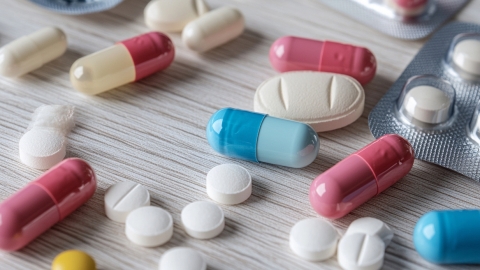Why does urine turn yellow-green after taking B-complex vitamins?
Under normal circumstances, yellow-green urine after taking B-complex vitamins may be caused by vitamin B2 metabolism and excretion, excessive vitamin intake, urethritis, cystitis, or hepatobiliary duct stones. Appropriate management can be selected based on the specific cause. Detailed analysis is as follows:

1. Vitamin B2 Metabolism and Excretion
Vitamin B2 in B-complex vitamins is naturally yellow. The portion not fully absorbed by the body is excreted through urine, causing it to appear yellow-green. No special treatment is required. Urine color will gradually return to normal after reducing vitamin B2 intake. Increasing daily water intake appropriately can help promote metabolism.
2. Excessive Vitamin Intake
Taking excessive amounts of B-complex vitamins at one time exceeds the body's metabolic capacity. The surplus vitamins and their metabolites are excreted in urine, leading to darker yellow-green urine. Reduce dosage according to instructions or medical advice, avoid over-supplementation, monitor changes in urine color, and drink more warm water to help dilute urine.
3. Urethritis
Inflammation caused by bacterial infection of the urethra leads to mucosal congestion and exudation. Secretions mix with urine and combine with B-vitamin metabolites, resulting in yellow-green urine, often accompanied by frequent urination and painful urination. Under medical guidance, medications such as levofloxacin tablets, cefuroxime axetil tablets, or azithromycin dispersible tablets may be prescribed. Maintain cleanliness of the urethral opening and increase fluid intake to promote resolution of inflammation.
4. Cystitis
Inflammation of the bladder mucosa due to bacterial or viral infection can cause mucosal damage, bleeding, or secretion production. When mixed with urine containing B-complex vitamins, this results in yellow-green urine, often accompanied by urgency and lower abdominal pain. Under medical supervision, medications such as cefaclor capsules, norfloxacin capsules, or nitrofurantoin enteric-coated tablets may be used. Avoid holding urine, maintain personal hygiene, and reduce bacterial growth.
5. Hepatobiliary Duct Stones
Stones in the hepatobiliary ducts can block bile flow, preventing bile excretion. Bilirubin then refluxes into the bloodstream and is excreted in urine, turning it yellow-green. This condition is often accompanied by abdominal pain and jaundice. Under medical guidance, medications such as ursodeoxycholic acid capsules, anti-inflammatory and cholagogue tablets, or cholelithiasis-relieving tablets may be prescribed. For larger stones or severe symptoms, surgical removal via hepatobiliary ductotomy may be necessary. After surgery, follow a light diet and avoid greasy foods.
When supplementing with B-complex vitamins in daily life, adhere to recommended dosages and avoid blind overuse. Maintain good personal hygiene to prevent urinary tract infections. If urine color remains abnormal and is accompanied by discomfort, seek timely medical evaluation to identify the underlying cause and receive appropriate treatment, ensuring normal bodily metabolism.




